Q1) Can you please share a little about your journey with FIIB?
I graduated from FIIB in 2004 with a PGDM in International Business. The journey of FIIB was extensive and challenging, almost always, with a specific destination. The journey started with a vision, and a goal, to study the course, learn from the best faculty, collaborate, and compete with the most talented bunch of peers, and land a career at a top-notch organization.
This journey was a tough one, emotionally, physically, and mentally draining, yet very fulfilling. FIIB taught me to skillfully juggle between classes, assignments, projects, internships, and competitions. There were many subjects to study, classes to attend, case studies to analyze, and books to read! It did not matter whether a subject inspired me or not; I had to do what I was required to do. It’s not that I did not complain; I did, and yet I gave it all to learn as much as I could, for I know that this might just be the last formal education before I begin a life-long journey in the corporate world.
Q2) Please tell us how FIIB has helped you to bring change in you and helped in overall development.
FIIB had various clubs and societies that were run by students. These gave me the confidence to apply and appreciate the management concepts I learned in classes. Just like in real life, business organizations compete with other firms within and outside their industries, we compete to grab the best opportunities, score good marks, and build the widest networks, all with the purpose of making the most out of this opportunity.
Unlike as we all believe, the journey of an MBA at FIIB does not always end with bagging a great job offer, the most important reason, or why most pursue the program in the very first place, it continues when we enter the gates of the corporate organization as professional and credible management professional. I had two job offers even before I graduated. I chose my career in Finance. Generally, our expectation from an MBA is that we will make a difference with our presence helping the organization resolve some of its pressing challenges, and of course bag a fat salary. It is up to us, then, to showcase all that we have learned, gained, or experienced in those two years and take it to the next level.
Q3) Please tell us the role and responsibilities that you are leading at your company.
In my current job, I am the Director and Head of the Credit Analysis Unit for the Global Delivery Center in Silicon Valley Bank, the bank of the world’s most innovative companies and investors, providing commercial banking services, expertise, and insights to the Technology, Life Science and Healthcare, Private Equity, Venture Capital and Premium Wine Industries. I am responsible for the growth and management of the Credit Services function in the India GDC and contribute to the Bank’s growing loan portfolio while supporting the growth of the GDC. I manage the administration and maintenance of Commercial Banking credit facilities and exposures in line with the Bank’s Corporate Credit policy for US, EMEA, and APAC clients.
Q4) How has finance as a career evolved over the years as your vision for our students?
In recent times, the finance industry has rapidly evolved. The demand for technical skills and soft skills in finance has transformed the industry. As technical skills such as quantitative analysis, market forecasting, and technological literacy continue to grow, employers are also seeking financial experts with soft skills such as strong negotiation, critical thinking, and influencing, as they can benefit businesses and provide the greatest return on investment.
In the last few decades, the finance industry has been through some transformational changes. In 2008, the Global Financial Crisis saw the failure of financial firms that had been around for generations. Though, FinTech companies have multiplied, focusing their technology on specific financial problems while disrupting legacy financial institutions. Currently, new finance jobs are challenging traditional business models. From contactless payment and crowdfunding to share trading apps and Neo Banks. FinTechs have driven the evolution of traditional finance jobs to create a suite of new finance career paths. Some careers in FinTech have been replicated by legacy financial institutions, while others have been outsourced as part of the ever-expanding finance industry. The COVID-19 pandemic in 2020 and 2021 massively disrupted the finance industry on a global scale, to better serve customers who have grown accustomed to the speed and convenience of online banking and systems.
As the use of technology increases, the demand for these technical skills is expected to rise. Businesses in the financial industry are investing more in automation, analytics, data, and customer interaction technology. Due to this digital economy, new finance roles are materializing in Artificial Intelligence, Machine Learning, Robotic Automation, Cloud, and Data Analytics. So, whether you’re interested in analytics, corporate finance, or the constant evolution of FinTech, finance can offer you many career paths. As we become more digital, new finance roles will continue to emerge. I suggest that we all constantly upgrade ourselves to stay abreast with the growing industry needs, so we continue to stay competitive in our field. The career lies in your interest and how you evolve yourself to adapt to the change.
Q5) How has the Credit rating industry eased the Loans and helped the financial sector over the years?
We know that the credit rating industry plays a key role in the financial sector by helping to reduce the information irregularity between lenders and investors, on one side, and issuers on the other side, regarding the creditworthiness of the borrower. This overreaction may have deteriorated the financial crises in the past, contributing to financial instability and cross-country strains.
However, their roles have expanded with financial globalization as they have received an additional enhancement from Basel norms for setting new rules for credit risk. This is guiding institutions to take tolerable steps to decide on the borrower’s assessment of their ability and willingness to meet their obligations.
Moreover, in the new financial architecture, Credit Agencies are expected to become more important in the management of credit risk. The simple underlying logic is that the Issuers with lower credit ratings pay higher interest rates representing larger risk premiums than higher-rated issuers impacting the loan terms and resulting in stringent covenants and conditions.
Q6) Please share a message you would like to convey to the FIIB community(students/management).
The journey of an MBA does not conclude so easily. One does not stop learning after the MBA program. In fact, one must learn, even more, to stay with the times. One also does not stop competing with others, because the organization has limited opportunities and too many people with boundless aspirations to manage. My message to all is that we should not stop growing our network because we have landed a good job; to get ahead, we must widen our circle. We also carry the brand of the institute along and continue to support and contribute wherever required so our connection with the Institute does not come to an end. An MBA, then, is a lot like life. It is about constantly reinventing ourselves, rebuilding our skills and knowledge, proving our caliber time after time, and very importantly, unlearning what’s not relevant and constantly relearning to continue to stay on top of the demand.

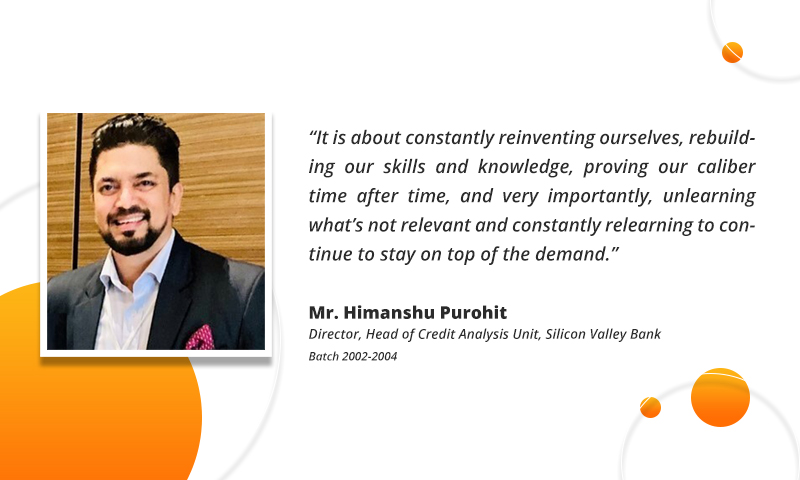
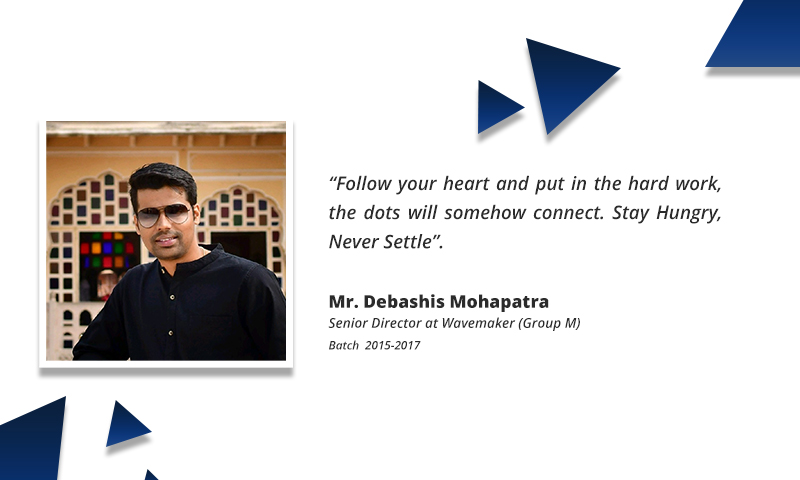
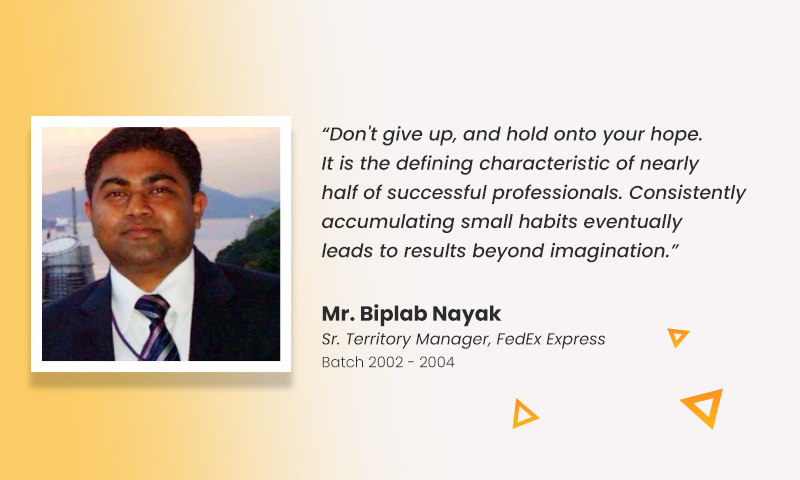





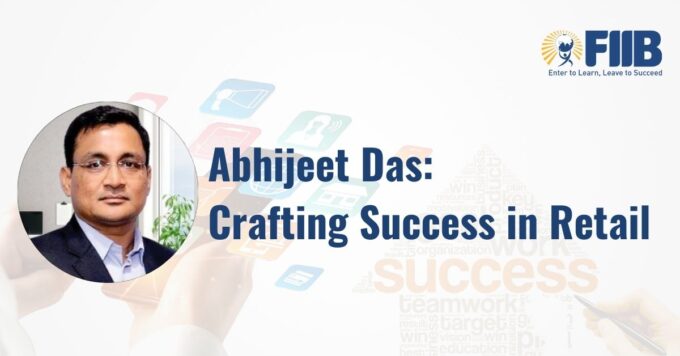
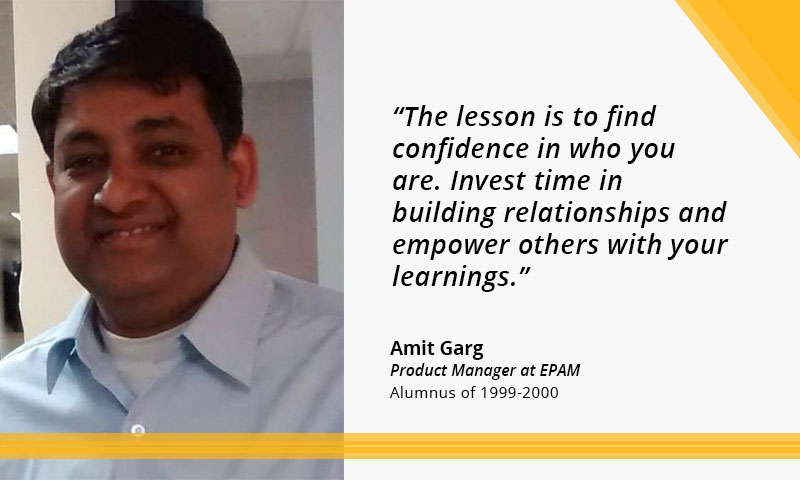


Leave a comment